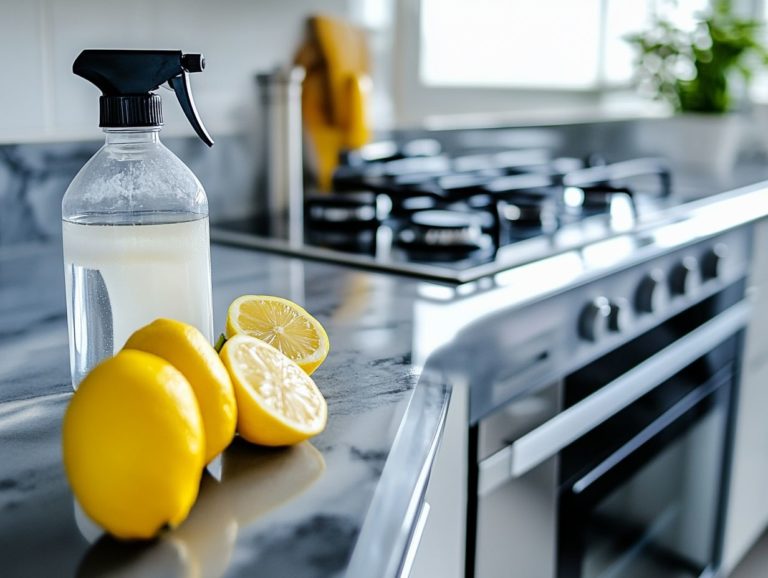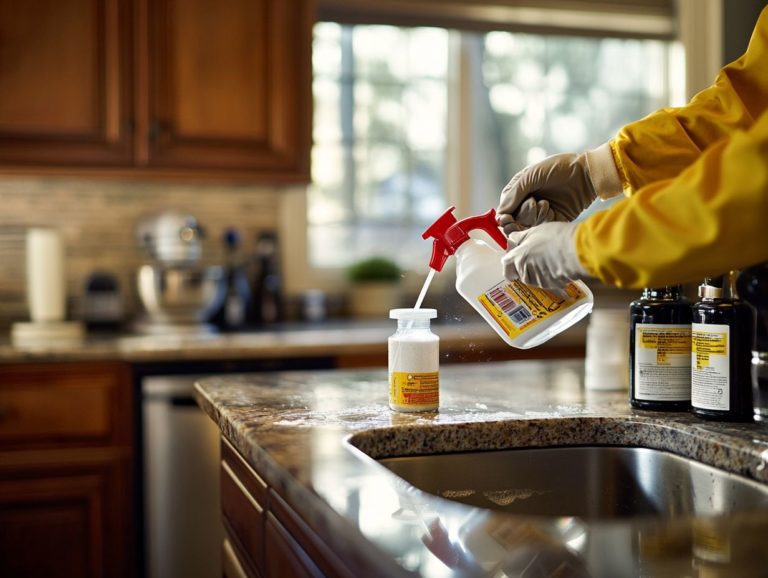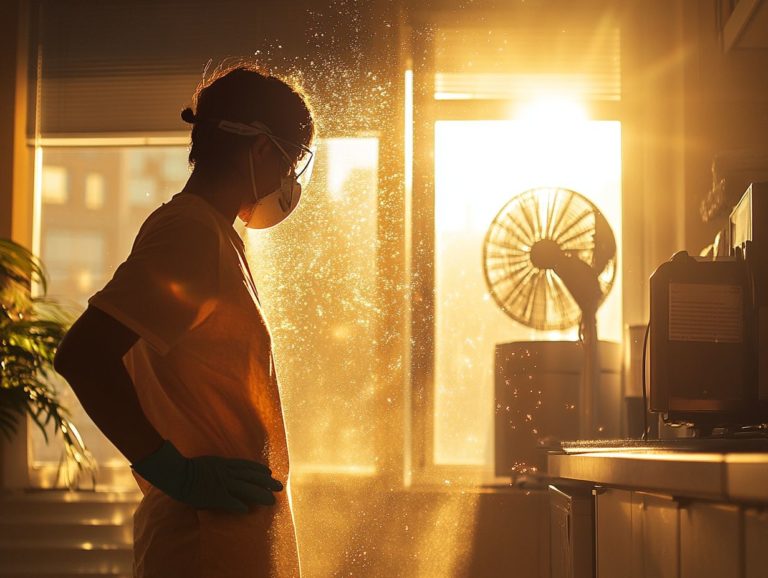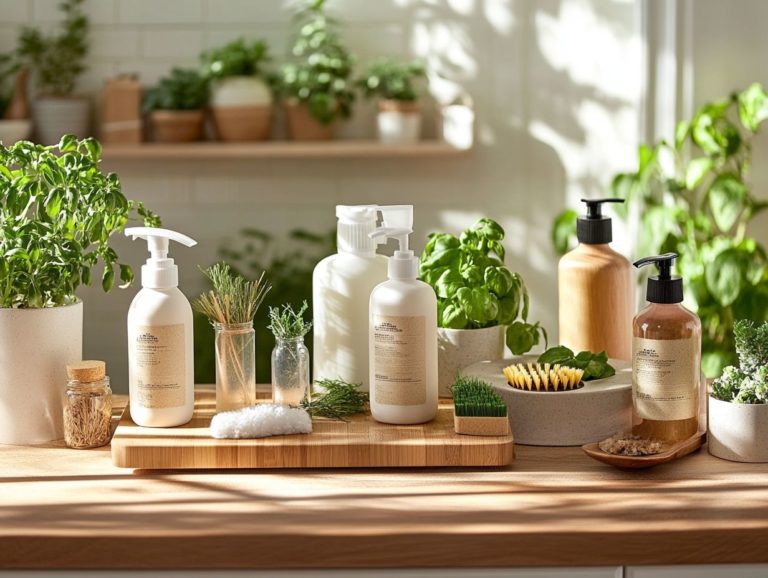How to Properly Dispose of Old Cleaners?
As you work towards a cleaner home environment, it s easy to overlook the fate of those household chemicals and cleaning products you no longer need.
Proper disposal of old cleaners is essential for your safety and the well-being of the environment. This exploration delves into the significance of responsible disposal, the types of cleaners you might encounter, and how to recognize those that have outlived their usefulness. Improper disposal can lead to serious consequences.
Here are practical tips for disposing of both chemical and natural cleaners, alongside cleaning products that are better for the environment worth considering. From recycling containers to following local regulations, it s about making informed choices for a healthier home and a thriving planet.
Contents
- Key Takeaways:
- Why Is Proper Disposal of Old Cleaners Important?
- What Are the Different Types of Cleaners?
- How to Identify Old Cleaners for Disposal?
- How to Dispose of Old Natural Cleaners?
- What Are the Alternatives to Chemical Cleaners?
- Frequently Asked Questions
- What qualifies as old cleaners and household chemicals?
- Why is it important to properly dispose of old cleaners and household chemicals?
- How do I know if a cleaner is safe to dispose of and follows local regulations?
- Can I pour old cleaners down the drain or recycling containers?
- What is the best way to dispose of old cleaners and hazardous materials?
- Can I recycle old cleaners and cleaning agents?
Key Takeaways:
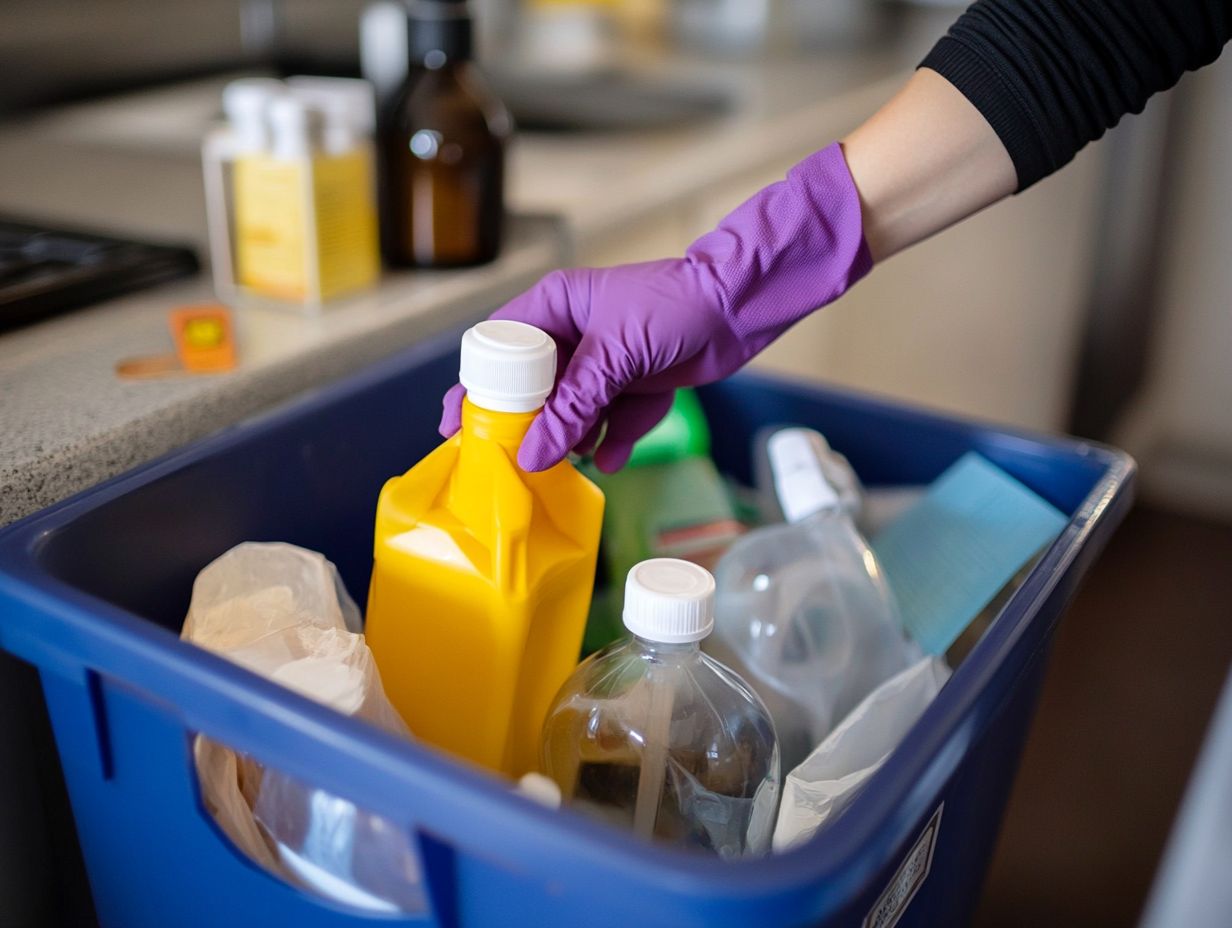
- Proper disposal of old cleaners is essential to protect the environment and human health, ensuring the safety of our water sources and wildlife.
- Identify old cleaners by checking expiration dates on product labels and looking for signs of deterioration.
- Dispose of old chemical cleaners by following label instructions, taking them to a hazardous waste facility, or using the dilution method if safe.
Why Is Proper Disposal of Old Cleaners Important?
Proper disposal of old cleaners is vital for your health and the well-being of the environment. Many household cleaning products contain hazardous materials that, when discarded incorrectly, can cause significant harm to the ecosystem.
Improper disposal can lead to contamination of soil and water sources, posing serious health risks to both wildlife and humans. The long-term effects can ripple through entire communities and ecosystems.
By following community guidelines and embracing eco-friendly disposal options, you can mitigate these risks and champion sustainability and waste reduction in your waste management practices.
What Are the Different Types of Cleaners?
Understanding the various types of cleaners available is crucial for effective household cleaning and safe disposal practices. The market presents a wide array of cleaning solutions, which can be broadly categorized into chemical cleaners and natural cleaners.
Chemical cleaners often boast powerful agents that can tackle tough messes, but they may raise health concerns due to their toxic components. In contrast, natural cleaners provide an eco-friendly alternative, crafted from safe and sustainable ingredients that are gentler on both health and the environment.
Brands like Fomin excel in offering multi-surface cleaners that seamlessly blend efficacy with eco-conscious choices, making them a smart addition to your cleaning arsenal. These eco-friendly products contribute to a safer and more sustainable home environment.
1. Chemical Cleaners
Chemical cleaners are commonly used products containing various agents formulated to effectively eliminate dirt, grime, and stains. However, many of these cleaners especially those featuring chlorine bleach or fabric softeners can pose significant health risks if misused or improperly disposed of. It s essential to read the label carefully, understand the ingredients, and recognize the potential hazards associated with these products to ensure their safe usage and disposal.
These cleaners fall into several categories, including disinfectants (which kill germs), all-purpose cleaners (for various surfaces), degreasers (for tough grease), and specialty products tailored for specific applications. Each type serves unique purposes in both residential and commercial environments, making them invaluable for maintaining hygiene and cleanliness. Some cleaning agents, like air fresheners, also provide added benefits for a pleasant living space.
Be aware that exposure to harmful chemicals found in these cleaning agents can lead to respiratory issues, skin irritations, or even long-term health effects. Therefore, always follow the manufacturer’s instructions, use necessary protective gear when advised, and adhere to proper disposal methods. This approach minimizes the environmental impact and reduces personal risks associated with hazardous materials. Proper disposal methods include taking the waste to community collection centers or hazardous waste facilities.
2. Natural Cleaners
Natural cleaners have become increasingly popular, thanks to their eco-friendly properties and minimal health concerns. They are the go-to choice for many households. These natural products often feature ingredients that break down naturally and plant-based formulas that handle a variety of cleaning tasks without the toxic aftereffects that come with conventional cleaning agents.
By choosing natural cleaning supplies, you not only contribute to a safer environment but also achieve impressive cleaning results.
These cleaners are safe for children and pets, alleviating worries about chemical exposure. Common natural cleaning agents like vinegar, baking soda, and essential oils effectively tackle odors, stains, and grime.
If you re inclined toward do-it-yourself (DIY) solutions, creating your own cleaning products is remarkably simple. Here s how:
- For a fantastic glass cleaner, mix equal parts water and vinegar.
- A paste of baking soda and water can scrub surfaces to perfection.
These methods allow you to customize your cleaning approach while ensuring harmful chemicals are kept at bay, promoting a healthier living space.
How to Identify Old Cleaners for Disposal?
Identifying outdated cleaners for proper disposal is crucial for maintaining a safe and effective cleaning environment. Household chemicals often have expiration dates or noticeable signs of deterioration that indicate they should no longer be in use. Regularly auditing your cleaning supplies ensures safety.
Check product labels for recommended disposal methods and any associated hazards. This diligence prevents harmful chemicals from being discarded improperly, safeguarding both your space and the environment. Avoiding improper disposal helps prevent contamination of soil and water sources.
1. Check the Expiration Date
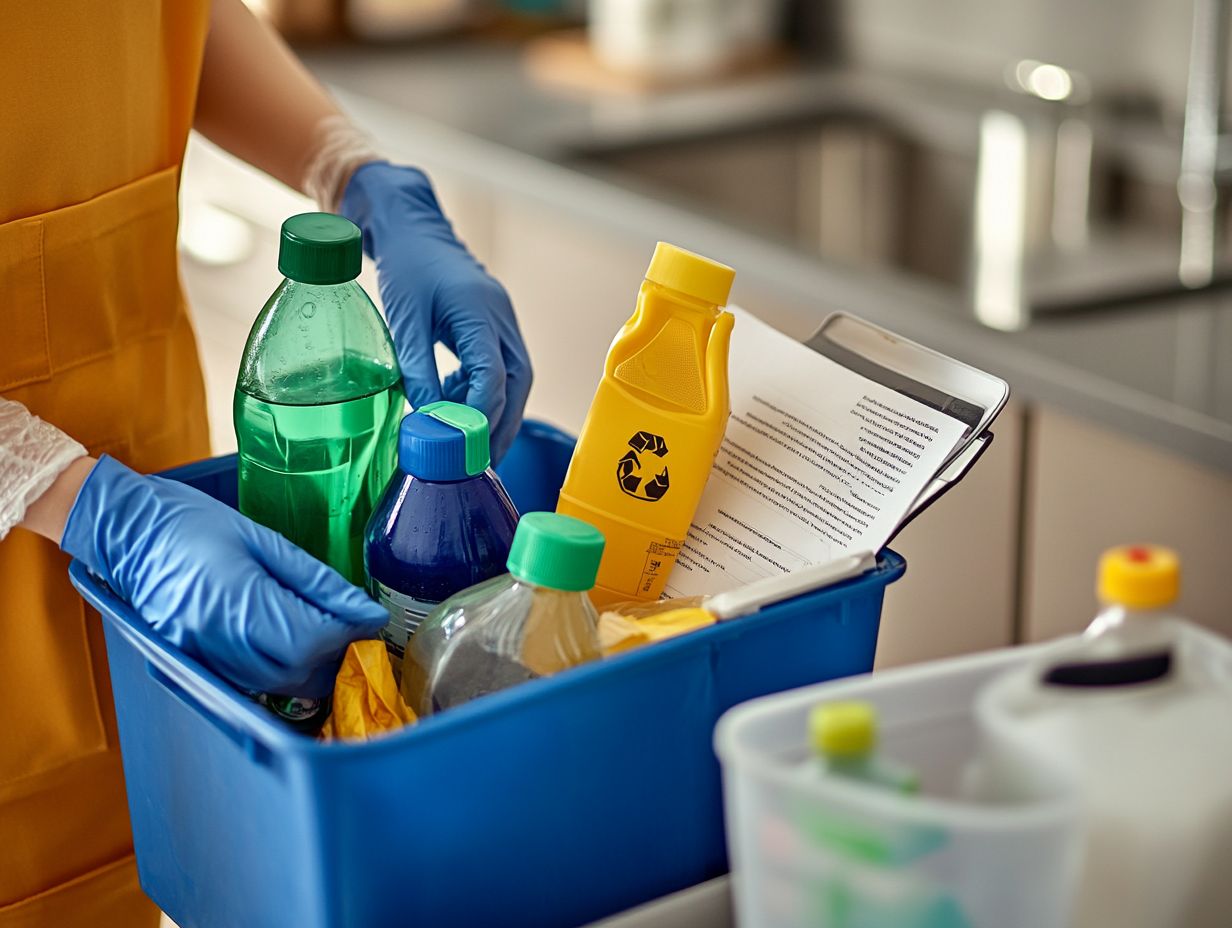
Checking the expiration date on your cleaning products is a crucial step in assessing their usability and safety for disposal. Many cleaning agents come with specific expiration dates that indicate when they might no longer be effective or safe to use. Following these guidelines helps ensure proper disposal and minimizes any health risks.
Don’t underestimate the significance of these dates. Using expired products can diminish cleaning performance and even pose risks to your health. A product that has passed its expiration date might fail to sanitize or remove stains effectively and could break down into harmful substances.
To manage your cleaning supplies efficiently, consider these tips:
- Label containers with purchase dates.
- Regularly audit your inventory.
- Adopt a first-in, first-out system: use older products before newer ones.
- Store items in a cool, dry place to extend their shelf life and protect your environment from potential chemical reactions that could lead to hazards like landfill fires.
2. Look for Signs of Deterioration
Recognizing signs of deterioration in your cleaning supplies is vital. It protects your health and ensures effective cleaning. Deterioration signs may show through changes in color, separation of ingredients, or unusual odors. These are clear indicators that a product may no longer be reliable or safe for use.
By being vigilant and identifying these signs promptly, you can dispose of the items in a timely manner, thus preventing potential health hazards. Consider alternative methods to store and manage these products effectively.
It s crucial to regularly inspect your cleaning products for these telltale indicators, as subtle changes can often go unnoticed over time. Expired or degraded products lose effectiveness and can pose risks if they contain harmful chemicals.
When you notice any of these signs, the best course of action is to stop using the product right away. Follow the manufacturer s disposal guidelines and ensure that any remaining materials are kept out of reach of children and pets. This practice supports environmental protection and reduces health risks.
By diligently checking for signs of deterioration, you can foster a healthier environment and uphold effective cleaning practices. This vigilance contributes to eco-friendly living and a safer household.
How to Dispose of Old Chemical Cleaners?
Safely disposing of old chemical cleaners is crucial for preventing environmental harm and safeguarding public health. Always adhere to local regulations regarding dangerous waste, ensuring that these potentially toxic substances don t contaminate the environment. Utilize community collection programs and follow recommended disposal methods.
Before you proceed with disposal, it’s important to follow necessary safety precautions. Wear protective gear to avoid direct contact with harmful chemicals. Taking these steps keeps you safe and plays a crucial role in protecting our planet! Always adhere to community guidelines and local regulations.
1. Follow the Instructions on the Label
Following the instructions on product labels is essential for the responsible disposal of chemical cleaners. These labels typically offer critical guidelines on how to dispose of hazardous materials safely, allowing you to minimize your environmental impact while complying with local regulations. Ignoring these instructions could lead not only to legal issues but also to significant health risks. Safe disposal practices protect the environment and public health from harmful effects.
For example, some cleaners may require you to dispose of the product at a designated hazardous waste facility. Others might recommend diluting the chemical before pouring it down the drain, a practice that can help reduce contamination. Improper disposal can trigger dangerous chemical reactions, contaminate groundwater, or harm wildlife.
It s easy to overlook these important directives. Understanding and adhering to the specific disposal methods outlined on labels is vital to preventing accidents and protecting both your health and that of the community.
2. Take Them to a Hazardous Waste Facility
Taking your old chemical cleaners to a hazardous waste facility is one of the safest disposal methods available. These facilities are meticulously designed to handle hazardous materials, ensuring their disposal aligns with local regulations and significantly reducing the risk of environmental contamination. Choosing this route reflects a responsible commitment to managing your household chemicals safely.
As you prepare for your drop-off, gather all your outdated or unused cleaners in a sturdy container. Ensure the lids are securely fastened to prevent any leaks. When you arrive at the facility, you ll find clear signage guiding you to the designated drop-off area. Expect to see staff members available to assist you, providing guidance on where to place your materials and addressing any questions you might have about the process.
This careful handling reinforces the effectiveness of local waste management programs and plays a crucial role in educating the community about safe disposal practices, promoting a healthier environment for everyone.
By following these disposal guidelines, you re not just cleaning your home but also helping create a safer, healthier world for everyone!
3. Safe Disposal: Dilute and Flush
Using the dilution method to flush small quantities of certain cleaning products down the toilet can be a viable alternative disposal method, but only if the product label allows it. This method cuts down dangerous substances in our waste, protecting our environment! It s crucial for you to confirm that the specific product is suitable for this disposal method to avoid any unintended chemical reactions.
Be sure to consult local regulations to ensure you re in compliance with waste disposal guidelines, as some areas have strict rules against flushing particular substances. Proper disposal practices not only protect the local ecosystem but also prevent contamination of water sources, ultimately safeguarding public health.
When in doubt, it s wise to explore other disposal options, such as waste collection facilities or recycling programs. By opting for safe disposal methods, you contribute significantly to promoting environmental sustainability and reducing the impact of cleaning products on our natural surroundings.
How to Dispose of Old Natural Cleaners?
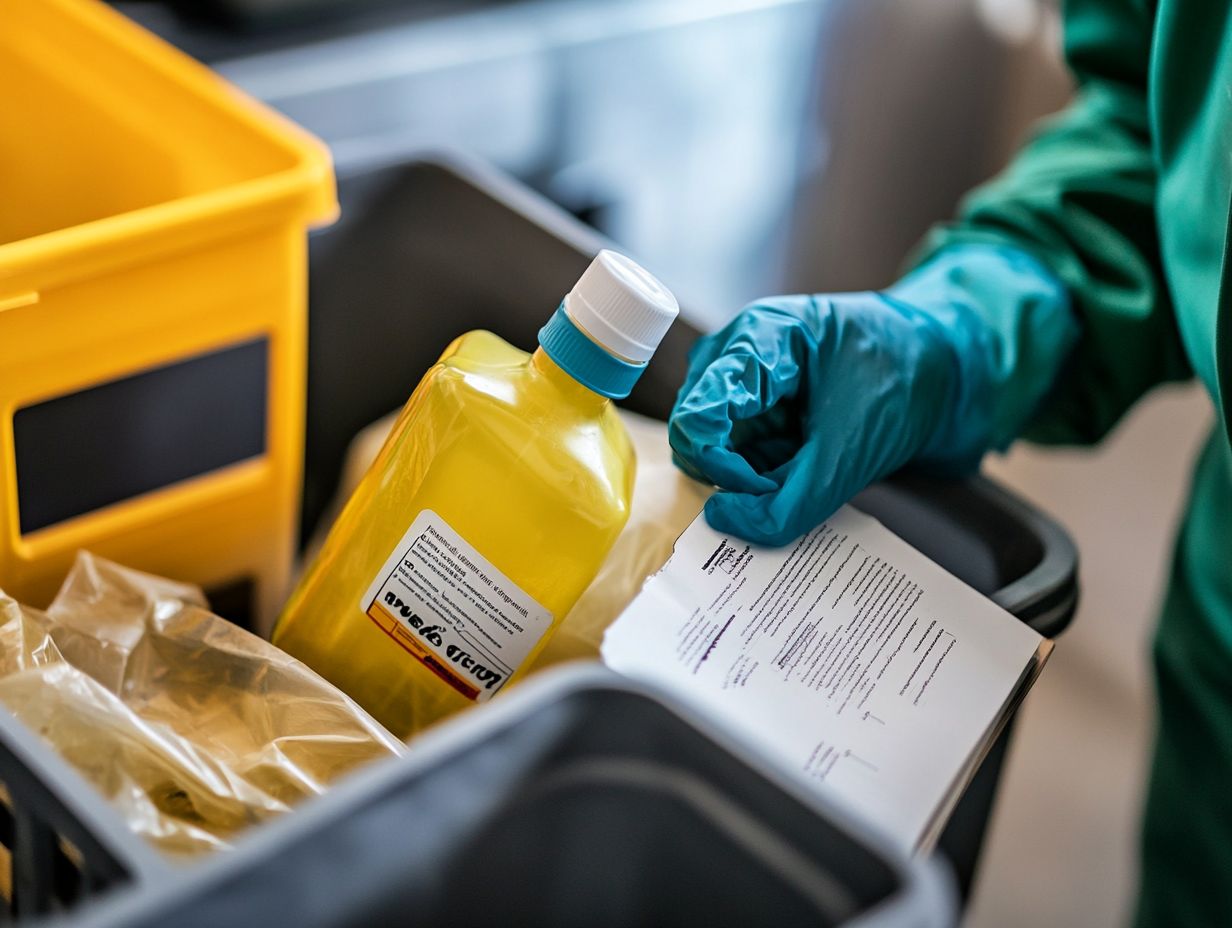
In terms of disposing of old natural cleaners, you can safely and responsibly dispose of them, ensuring minimal impact on the environment. Unlike their chemical counterparts, many natural cleaning products break down naturally over time, allowing you to either use them up or dispose of them through eco-friendly methods.
This makes them an excellent choice for anyone looking to maintain effective cleaning practices while being mindful of their ecological footprint.
1. Use Them Up
One of the simplest ways for you to dispose of old natural cleaners is to use them until they ve lost their oomph. Using cleaners until they’re empty cuts down on waste and is eco-friendly. By doing this, you contribute to effective cleaning while minimizing the environmental impact linked to disposal.
To maximize the effectiveness of these products, a few straightforward tips can make a world of difference. For instance, combining vinegar and baking soda creates a powerful natural cleaning duo, ideal for tackling stubborn stains and grime. Just remember to steer clear of mixing vinegar with bleach, as that can produce harmful gases. Instead, feel free to experiment with pairings that complement each other, like lemon juice and olive oil for a refreshing furniture polish. Make sure surfaces are clear of debris before applying cleaner to enhance absorption and efficacy.
By effectively utilizing these remaining natural cleaners, you not only keep your spaces spotless but also embrace a more sustainable lifestyle.
2. Donate to Local Organizations
Donating your old natural cleaners to local organizations is a fantastic way to ensure they re put to good use while making a positive impact in your community. Many places, like shelters and community centers, would be grateful for safe and effective cleaning supplies. This supports eco-friendly living and helps reduce waste, fostering a culture of sustainability right where you live.
Various groups, including food banks, nonprofits focused on environmental issues, and even local schools, often welcome such donations, understanding the value of accessible cleaning products. Just remember, it s essential to ensure that these items are still usable; expired or ineffective products can cause more harm than good.
Donating natural cleaners helps community initiatives minimize waste, such as local recycling programs or workshops that teach sustainable practices. Together, these efforts not only cultivate a cleaner environment but also strengthen community bonds and encourage a shared responsibility for a healthier planet.
Join us in making a difference dispose of your cleaning products responsibly today!
3. Make Your Own Cleaning Products
Creating your own cleaning products stands as a sustainable alternative to buying new supplies. It gives you full control over the ingredients you choose.
Homemade cleaning products can be just as effective as commercial natural cleaners. They often rely on simple household staples like vinegar and baking soda. This practice reduces waste and promotes eco-friendly cleaning solutions that are safe for both the planet and your health.
This method benefits the environment and is remarkably cost-effective. Many of these ingredients are likely already sitting in your kitchen. By opting for homemade solutions, you can minimize your exposure to harsh chemicals commonly found in store-bought cleaners. These chemicals often contribute to indoor air pollution and environmental degradation.
Crafting your own personalized cleaning solutions allows for a level of customization in terms of fragrance and effectiveness. This makes it easier for you to address specific cleaning needs. By embracing this green cleaning method, you can foster a healthier home environment while simultaneously supporting ecological sustainability.
What Are the Alternatives to Chemical Cleaners?
Exploring alternatives to chemical cleaners is essential for anyone seeking eco-friendly and non-toxic cleaning solutions. You ll find a wealth of effective cleaning methods that utilize natural ingredients, delivering both environmental benefits and safety for everyone in your household.
Consider options like vinegar, baking soda, and biodegradable cleaners. Biodegradable means they break down naturally and don’t harm the environment. These choices have gained popularity for their ability to clean effectively, all while steering clear of the harmful side effects often linked to conventional chemical agents.
1. Vinegar and Baking Soda
Vinegar and baking soda are two of the most popular and versatile natural cleaners you can use to tackle a variety of cleaning tasks with ease. Known for their eco-friendly properties, these ingredients can be employed individually or together to create powerful cleaning solutions for everything from kitchen surfaces to bathroom fixtures. They provide a safe alternative to chemical cleaners while also being easy on the wallet.
Each of these substances shines in specific applications. For example, vinegar serves as an exceptional deodorizer and disinfectant, making it perfect for wiping down countertops or giving your refrigerator a refreshing boost. On the other hand, baking soda acts as a gentle abrasive, ideal for scrubbing pots, pans, and sinks without causing any damage.
When faced with stubborn stains in carpets, try mixing baking soda with water to create a paste. Apply it to the stain and let it sit for a bit. Then follow up with a vinegar spray. You’ll enjoy the bubbly reaction that lifts dirt and odors right away.
By integrating vinegar and baking soda into your cleaning routine, you can significantly reduce your dependence on harmful chemicals. This fosters a healthier environment for both your family and pets.
2. Essential Oils
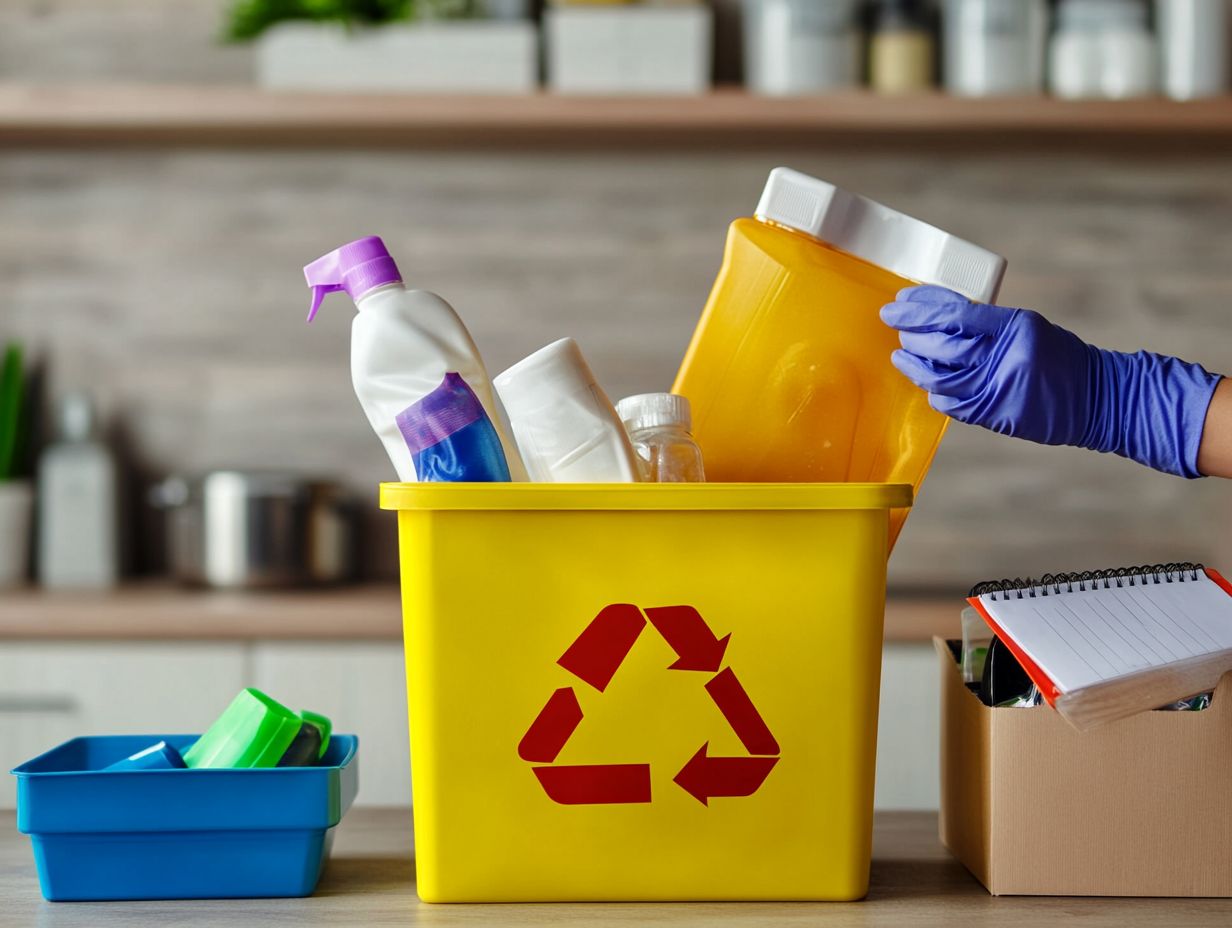
Essential oils have become a sought-after choice for those looking to embrace natural cleaning solutions. They offer not only impressive cleaning power but also delightful fragrances. These concentrated plant extracts are packed with antibacterial and antifungal properties, making them perfect companions for enhancing your homemade cleaning concoctions.
By integrating essential oils into your cleaning routine, you can enjoy a refreshing scent while fostering a healthier living environment. Beyond their cleaning prowess, these oils can uplift your mood and create a calming ambiance, transforming mundane chores into enjoyable activities.
When crafting your DIY cleaning products, consider blending oils such as tea tree, renowned for its potent disinfectant qualities, or lavender, celebrated for its soothing fragrance. Using natural products such as these can reduce the environmental impact of your cleaning solutions.
For a versatile multi-surface cleaner, a simple recipe might include a mixture of distilled water, vinegar, and a few drops of your chosen essential oils. It’s essential to opt for high-quality, pure essential oils to ensure maximum effectiveness and safety. This allows you to fully tap into the benefits of nature in your cleaning regimen. Additionally, using eco-friendly and sustainable ingredients is a great way to practice eco-conscious choices.
Ready to make a change? Start with these simple homemade cleaning solutions today!
3. Biodegradable Cleaners and Household Cleaning Solutions
Biodegradable cleaners are thoughtfully crafted products designed to break down naturally after use, significantly reducing their environmental impact. These cleaners blend effective cleaning power with eco-friendly ingredients, making them the perfect choice for those who seek to minimize their carbon footprint while ensuring a safe and healthy home.
A wide range of biodegradable products is available, catering to your diverse cleaning needs. Examples include multi-surface cleaners, cleaning sprays, and other cleaning agents.
Take brands like Seventh Generation and Ecover, for example. They provide versatile options that tackle tough stains and disinfect surfaces without the harshness typically found in traditional chemical cleaners. By selecting biodegradable solutions, you can enjoy the peace of mind of helping to make the planet healthier while improving indoor air quality. These choices also help reduce the health risks associated with toxic cleaning products.
These products usually feature plant-based ingredients that are effective yet gentle on both skin and surfaces, offering a sustainable alternative for your everyday cleaning tasks. They contribute to waste reduction and minimize the presence of harmful chemicals in your home.
Choosing biodegradable cleaners is a smart choice that makes a real difference! Embracing these solutions is more than just a fleeting trend; it’s a meaningful step toward a more conscious and environmentally friendly lifestyle.
Frequently Asked Questions
What qualifies as old cleaners and household chemicals?
Old cleaners refer to any household cleaning products that are expired, no longer in use, or have been partially used and forgotten. This includes cleaning supplies like Chlorine Bleach and Fabric Softener that have passed their expiration dates.
Why is it important to properly dispose of old cleaners and household chemicals?
Improper disposal of old cleaners can harm the environment, as they contain chemicals that can seep into soil and water sources. It can also be dangerous for sanitation workers who handle waste. Additionally, improper disposal can lead to landfill fires and other environmental protection issues.
How do I know if a cleaner is safe to dispose of and follows local regulations?
You can check the label of the cleaner for specific disposal instructions. Read the label carefully, and if there are no instructions, assume it is not safe to dispose of in regular household garbage. Always follow local regulations regarding hazardous waste, which is any waste that can be harmful to health or the environment.
Can I pour old cleaners down the drain or recycling containers?
No, it is not safe to pour old cleaners down the drain as it can contaminate water sources and harm aquatic life. Some cleaners may also react with other chemicals in the sewage system, causing damage. This practice disrupts water quality and can result in dangerous chemical reactions.
What is the best way to dispose of old cleaners and hazardous materials?
The best way to dispose of old cleaners is to take them to a hazardous waste collection facility. Many cities and towns have designated drop-off locations for household hazardous waste. Refer to community guidelines for proper disposal methods.
Can I recycle old cleaners and cleaning agents?
No, old cleaners cannot be recycled. They contain chemicals that can contaminate the recycling process and cause harm to workers. It is best to dispose of them at a hazardous waste collection facility. Always follow safety precautions and use proper storage until they can be safely discarded.
Start making eco-friendly choices today!

